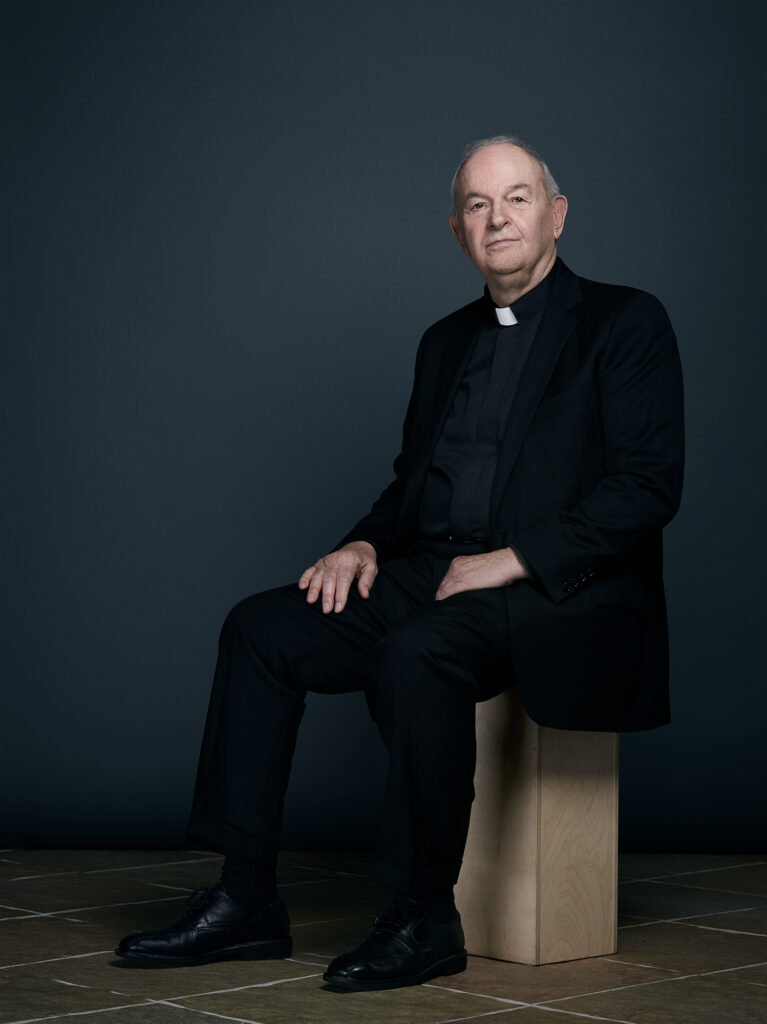
Fifty-four years after coming to the LMU campus, Richard Robin S.J. celebrates his retirement this year in 2023. That’s three years after he actually stepped down from his university duties as alumni chaplain. But the event was delayed by the COVID pandemic.
Robin, attended the University of San Francisco in the city in which he was raised. H entered the Society of Jesus in 1954 and was ordained in 1967. Robin was asked in 1969 to set aside his doctoral studies to take a post as assistant dean of men at then-Loyola University. Aside from four years as assistant director of novices for the California province of the Society of Jesus, Robin has worked in Student Life, Admission, the President’s office and the office of Alumni Engagement, where he served as alumni chaplain. He also served as moderator for Crimson Circle, the university’s first service organization.
Today Robin remains active as Minister of the House, a leadership position in the LMU Jesuit community, second to the Jesuit rector, Eddie Siebert, S.J., with responsibility for material needs of his fellow community members. Robin has said he believes in always looking forward, but for a brief time one recent afternoon, he agreed to take a glance in the rear-view mirror. He was interviewed by Editor Joseph Wakelee-Lynch.
What drew you to the Jesuits when you entered? Was it the opportunity to be in education? Was it the life in community that the Jesuits live?
It had more to do with education. I was impressed by what I was the young Jesuits doing, especially as moderators of student activities. We had a lot of young ones in those days. I went to a Jesuit high school, and I was impressed by their lives. I didn’t know what I was getting into at all.
After entering and before your ordination, were there moments when you thought to yourself, “Maybe this is not the right thing for me after all.”
Many times. But a good friend of mine who was a Jesuit would tell me all the time to stay.
Were those moments due to questioning your vocation, or was it the case that your faith was intact but you weren’t sure about the lifestyle?
It was more about the lifestyle. I don’t think I would consider myself a pious Catholic. I was never an altar boy. I prayed. But when I joined the Jesuits, I never thought about the priesthood. All I thought about were the scholastics, the younger Jesuits before they were ordained. I liked the work they did. All of a sudden when I became a priest, it was startling.
“All of a sudden”? The Jesuits are famous for not ordaining people for 10 to 12 years after they enter!
I know! It wasn’t that exciting. My work at school was very satisfying. I enjoyed being with people, I enjoyed parties. Being priest wasn’t a big deal for me.
Did becoming ordained, becoming a priest officially, help you to do the things you really were excited about and satisfied by?
Well, it changed you in the sense that people felt more comfortable in some ways.
I imagine that once you were ordained, many laypeople then had a clear, understandable way to relate to you, and perhaps that made them more comfortable.
That may be true.
A question about being in the Society during the 1960s and ’70s: That was a time when men left the priesthood in large numbers. Was that a hard time for you personally?
Yes. I lost a lot of close friends, people I knew for a long time who all of a sudden were gone. There was a lot of change. Also, remember I was ordained in 1967, and that was in the middle of the impact of Vatican II. We were trained to say Mass in Latin, but my first Mass was in English. We didn’t have any training in English, it was all in Latin. And so many people left right after that. That was hard.
You’re retired but continue to live and work here. How long will you be here at LMU?
Probably just till I die. My health isn’t good, some heart problems. I just got a pacemaker. I know I’m slowing down. As long as I can do this job, I’ll stay. Otherwise, Los Gatos [the Jesuit province retirement center].
What has been your greatest joy?
My greatest joy was living in the dorms and getting to know the students. I had a reputation for being too casual with the students. They called me Rock, and Rex (“the king”). Even when I was a younger Jesuit, other Jesuits called me Bird or Rockin’ Robin. But I felt that I could be myself when I lived in the dorms. I had a lot of good sessions at night when people would just come by and talk. We’d have good conversation, and I loved that. They remember that. That was very fulfilling.
Photo courtesy of Chris Yates ’16 and Robert Macaisa ’14 from “Emmaus: The Nature of the Way.”
